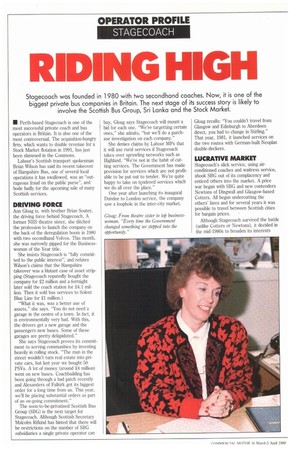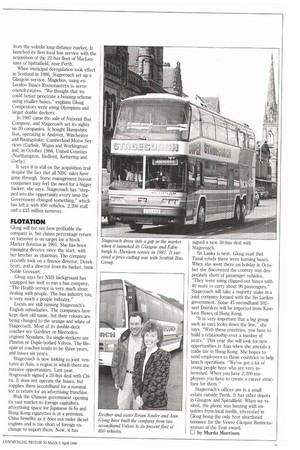RIDING HIGH
Page 60

Page 61

If you've noticed an error in this article please click here to report it so we can fix it.
Stagecoach was founded in 1980 with two secondhand coaches. Now, it is one of the biggest private bus companies in Britain. The next stage of its success story is likely to involve the Scottish Bus Group, Sri Lanka and the Stock Market.
• Perth-based Stagecoach is one of the most successful private coach and bus operators in Britain. It is also one of the most controversial. The acquisition-hungry firm, which wants to double revenue for a Stock Market flotation in 1991, has just been slammed in the Commons.
Labour's Scottish transport spokesman Brian Wilson has said its recent takeover of Hampshire Bus, one of several local operations it has swallowed, was an "outrageous fraud on the public purse", and bode badly for the upcoming sale of many Scottish services.
DRIVING FORCE
Ann Gloag is, with brother Brian Souter, the driving force behind Stagecoach. A former NHS theatre sister, she ditched the profession to launch the company on the back of the deregulation boom in 1980 with two secondhand Volvos. This month, she was narrowly pipped for the Businesswoman of the Year title.
She insists Stagecoach is "fully committed to the public interest"; and refutes Wilson's claims that the Hampshire takeover was a blatant case of asset stripping (Stagecoach reputedly bought the company for .22 million and a fortnight later sold the coach station for £4.1 million. Then it sold bus services to Solent Blue Line for £1 million.) "What it was, was a better use of assets," she says. "You do not need a garage in the centre of a town. In fact, it is environmentally very bad. With this, the drivers get a new garage and the passengers new buses. Some of these garages are pretty delapidated."
She says Stagecoach proves its commitment to serving communities by investing heavily in rolling stock. "The man in the street wouldn't turn real estate into private cars, but last year we bought 50 PSVs. A lot of money (around VI million) went on new buses. Coachbuilding has been going through a bad patch recently and Alexanders of Falkirk got its biggest order for a long time from us. This year, we'll be placing substantial orders as part of an on-going commitment."
The soon-to-be,privatised Scottish Bus Group (SBG) is the next target for Stagecoach. Although Scottish Secretary Malcolm Rifkind has hinted that there will be restrictions on the number of SBG subsidiaries a single private operator can buy, Gloag says Stagecoach will mount a bid for each one. "We're targetting certain ones," she admits, "but we'll do a purchase investigation on each company."
She denies claims by Labour MPs that it will axe rural services if Stagecoach takes over sprawling networks such as Highland. "We're not in the habit of cutting services. The Government has made provision for services which are not profitable to be put out to tender. We're quite happy to take on tendered services which we do all over the place."
One year after launching its inaugural Dundee to London service, the company saw a loophole in the inter-city market. Gloag recalls: "You couldn't travel from Glasgow and Edinburgh to Aberdeen direct, you had to change in Stirling." That year, 1981, it launched services on the two routes with German-built Neoplan double-deckers.
LUCRATIVE MARKET
Stagecoach's stick service, using airconditioned coaches and waitress service, shook SBG out of its complacency and enticed others into the market. A price war began with SBG and new contenders Newtons of Dingwall and Glasgow-based Cotters. All began undercutting the others' fares and for several years it was possible to travel between Scottish cities for bargain prices. • Although Stagecoach survived the battle (unlike Cotters or Newtons), it decided in the mid-1980s to broaden its interests from the volatile long-distance market. It launched its first local bus service with the acquisition of the 22-bus fleet of MacLennans of Spittalfield, near Perth.
When municipal deregulation took effect in Scotland in 1986, Stagecoach set up a Glasgow service, Magicbus, using exLondon Buses Routemasters to serve council estates. "We thought that we could better penetrate a housing scheme using smaller buses," explains Gloag. Competitors were using Olympians and larger double deckers.
In 1987 came the sale of National Bus Company, and Stagecoach set its sights on 20 companies. It bought Hampshire Bus, operating in Andover, Winchester and Basingstoke; Cumberland Motor Services (Carlisle, Wigan and Workington) and, in October 1988, United Counties (Northampton, Bedford, Kettering and Corby).
It says it is still on the acquisition trail despite the fact that all NBC sales have gone through. Some management buyout companies may feel the need for a bigger backer, she says. Stagecoach has "stepped into the opportunity every time the Government changed something," which has left it with 850 vehicles, 2,200 staff and a 235 million turnover.
FLOTATION
Gloag will not say how profitable the company is, but claims percentage return on turnover is on target for a Stock Market flotation in 1991. She has been managing director since the start, with her brother as chairman. The company recently took on a finance director, Derek Scott, and a director from its backer, bank Noble Grossart.
Gloag says her NHS background has equipped her well to run a bus company. The Health service is very much about dealing with people. The bus industry too, is very much a people industry."
Locals are still running Stagecoach's English subsidiaries. The companies have kept their old name, but their colours are being changed to the orange and white of Stagecoach. Most of its double-deck coaches are Gardiner or Mercedesengined Neoplans. Its single-deckers are Plaxton or Duple-bodied Volvos. The lifespan of coaches tends to be three years, and buses six years.
Stagecoach is now looking to joint ventures in Asia, a region in which there are massive opportunities. Last year, Stagecoach signed a 20-bus deal with China. It does not operate the buses, but supplies them secondhand for a nominal fee in return for an advertising franchise.
With the Chinese government opening its vast market to foreign capitalists, advertising space for Japanese hi-fis and Hong Kong cigarettes is at a premium. China'benefits as it does not make diesel engines and is too short of foreign exchange to import them. Now, it has signed a new 30-bus deal with Stagecoach.
Sri Lanka is next. Gloag read that Tamil rebels there were burning buses. When she went there on holiday in October she discovered the country was desperately short of passenger vehicles. "They were using clapped-out buses with 40 seats to carry about 90 passengers." Stagecoach will take a majority stake in a joint company formed with the Sri Lankan government. Some 45 secondhand 102seat Daimlers will be imported from Kowloon Buses of Hong Kong.
"It is very important that a big group such as ours looks down the line," she says. "With these countries, you have to build a relationship over a number of years." This year she will look for new opportunities in Asia when she attends a trade fair in Hong Kong. She hopes to send employees to these countries to help launch operations. "We've got a lot of young people here who are very interested. When you have 2,200 employees you have to create a career structure for them."
Stagecoach's offices are in a small estate outside Perth. It has other depots in Glasgow and Spittalfield. When we visited, the phone was buzzing with enquiries from local media, interested in Gloag being the only Scot shortlisted nominee for the Veuve Clicquot Businesswoman of the Year award.
0 by Murdo Morrison








































































































































